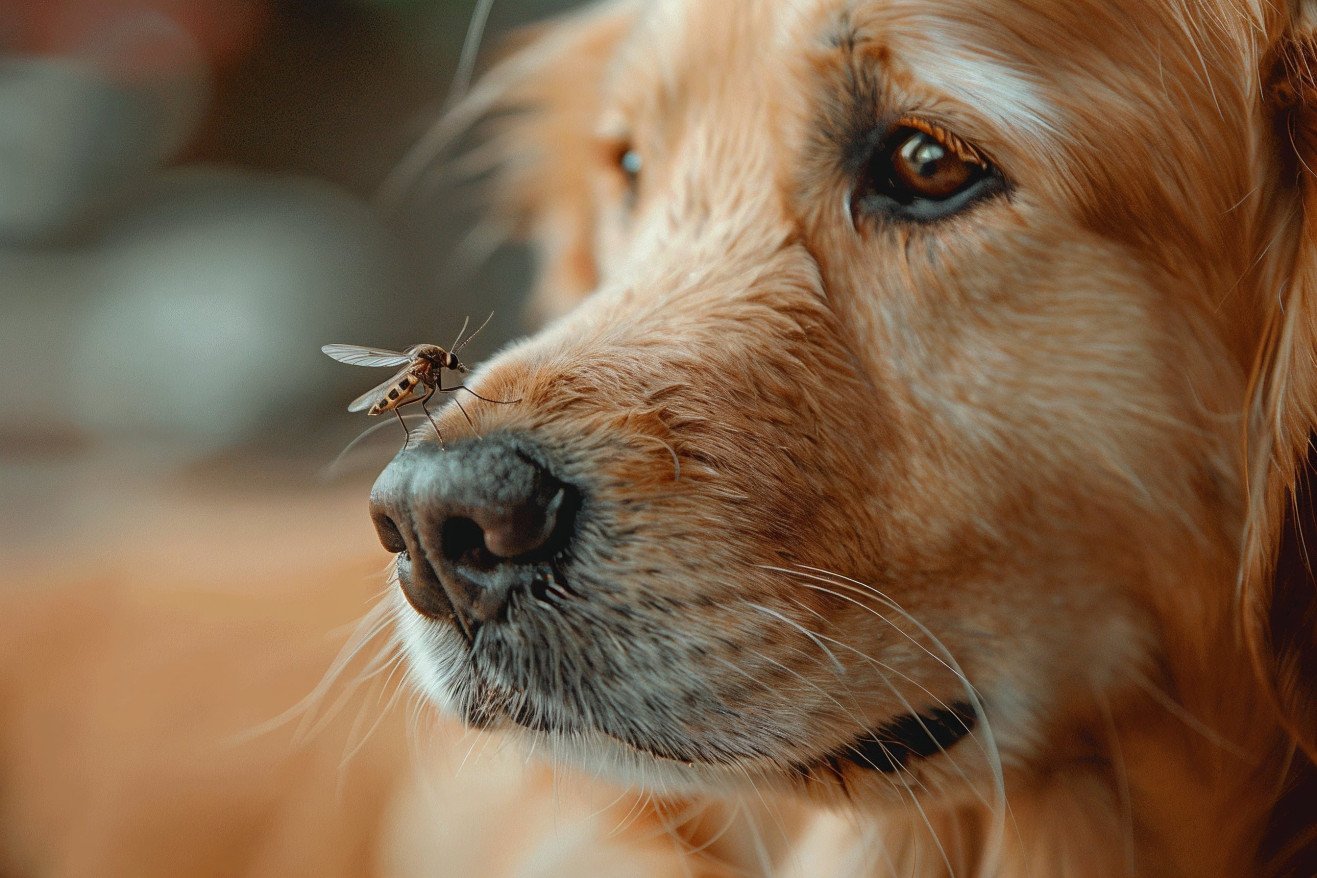Do Dogs Get Bitten by Mosquitoes? How to Keep Your Pup Safe
21 March 2024 • Updated 20 March 2024

Yes, just like their human owners, dogs can be bitten by mosquitoes. Mosquitoes are attracted to dogs by the carbon dioxide they exhale as well as compounds like lactic acid in their sweat and body heat. While generally harmless, mosquito bites can transmit diseases like heartworm to dogs, so taking preventative steps is important.
Because of the potential for insect-borne diseases and skin reactions, it's important for dog owners to know the symptoms of mosquito bites in dogs, as well as how to prevent and treat them.
This article will review information from veterinarians, entomologists, and other experts to give you a complete picture of this common summer problem and how it affects dogs.
Can dogs get mosquito bites?
How to Treat and Relieve Mosquito Bites on Dogs
If your dog has been bitten by mosquitoes, there are a few ways to tell. Per Your Pet and You, your dog may start licking, chewing, or scratching at the bite area. You may also see red, raised welts on your dog's skin, especially in areas like the back or flanks where mosquitoes are most likely to bite.
To help your dog feel better and reduce the itchiness and discomfort, there are a few safe options that are recommended by veterinarians. PetsBest recommends giving your dog a bath with colloidal oatmeal or using a cold compress to reduce swelling. You can also use natural treatments like a paste made from baking soda or aloe vera gel to help reduce inflammation, per BetterPet.
If your dog is having a more severe reaction, you can use over-the-counter antihistamines like Benadryl. According to PetsBest, you should talk to your vet to determine the right dose based on your dog's weight. However, make sure to only use products that are made for pets since human mosquito repellents that contain DEET can be poisonous to dogs.
While mosquito bites are generally a minor issue for dogs, it's important to help them find relief from the symptoms of their bites to avoid them scratching and causing more irritation or an infection. Luckily, there are several safe and simple treatments that you can use to help your dog feel better during mosquito season.
Mosquito-Borne Diseases and Health Risks for Dogs
By far, the most dangerous health risk for dogs that comes from mosquito bites is the potential for heartworm disease. As noted by the Animal Hospital of Dauphin County, heartworm disease is a potentially fatal condition caused by parasitic worms that can cause severe lung disease, heart failure, and organ damage in dogs. In some cases, infected dogs can have up to 50 adult worms in their heart and lungs.
Other mosquito-transmitted diseases that can impact dogs are West Nile virus, Eastern Equine Encephalitis, and Tularemia. According to WagWalking, these diseases can cause respiratory and digestive issues as well as neurological symptoms. Early detection and treatment are important since some mosquito-borne diseases can be fatal to dogs.
As noted by VMBS News, the treatment for heartworm disease is both costly and risky, with many potential side effects. This is why it's important to focus on prevention and make sure that your pet is on a regular schedule of heartworm prevention. By taking these steps, pet parents can make sure that their dogs are protected from the serious health dangers that come from mosquito-transmitted diseases.
Best Mosquito Repellents and Other Ways to Prevent Mosquito Bites in Dogs
Getting rid of standing water in your yard is important since mosquitoes lay their eggs in water, according to ChemFree Pest and Lawn. In addition, using mosquito repellents that are specifically designed for pets and that contain lemongrass oil or geraniol can help keep mosquitoes away, according to Vet's Best.
Veterinarian-recommended topical treatments, such as K9 Advantix II and Vectra 3D, can protect dogs from mosquitoes for up to a month, according to The Spruce Pets. In addition, environmental controls, such as fans, screens, and mosquito-repelling plants, can help reduce the number of mosquitoes in a dog's environment, according to Preventive Vet.
Dogs should be kept indoors during peak mosquito times, especially in the early morning and early evening, to reduce their risk of being bitten, according to Adams Pet Care. By following these tips, dog owners can help ensure their pets are safe and comfortable during mosquito season.
Why You Should Protect Your Dog From Mosquitoes Year-Round
The most dangerous thing about mosquitoes for dogs is the risk of heartworm disease. As the Animal Hospital of Dauphin County explains, heartworm disease is a severe infection caused by parasitic worms that can result in lung disease, heart failure, and organ damage in dogs. In fact, there can be up to 50 adult worms in a dog's heart and lungs in the most severe cases.
Veterinarians recommend year-round heartworm prevention medication to protect dogs from this life-threatening illness. As VMBS News points out, "Treatment of heartworm disease is expensive and potentially dangerous, with numerous side effects. The best option is to take preventative measures and develop a monthly heartworm preventative schedule to give to your pets."
Even in colder climates, mosquitoes can still be a problem in the warmer months, so it's important to protect your dog year-round. PetsBest notes that DEET-based repellents can be toxic to pets, so pet parents should work with their vet to create a heartworm prevention plan that's tailored to their dog. By doing this, dog parents can make sure their pets are protected from the dangerous mosquito-borne diseases.
Conclusion: How to Keep Your Dog Safe From Mosquito Bites
Although mosquito bites on dogs are usually not a big deal, they can be uncomfortable and potentially lead to serious diseases. Mosquitoes are attracted to dogs by a variety of factors, including the carbon dioxide they exhale, the lactic acid in their sweat, and their body heat. Most of the time, mosquito bites on dogs will cause itching, pain, and mild swelling at the site of the bite.
However, if dogs scratch or lick their bites too much, it can lead to skin damage and potential infections. While it's rare, some dogs can have severe allergic reactions to mosquito bites. The most significant risk is the potential transmission of heartworm disease, which is a potentially fatal condition caused by parasitic worms.
Other mosquito-borne diseases that can impact dogs include West Nile virus, Eastern Equine Encephalitis, and Tularemia. The symptoms of these diseases can include everything from respiratory and digestive symptoms to neurological issues. It's important to note that early diagnosis and treatment are important because some mosquito-borne diseases can be fatal to dogs if they're not treated.
To prevent dogs from getting bitten by mosquitoes and the diseases they carry, pet owners should use pet-safe repellents, remove standing water from their property, and avoid the times of day when mosquitoes are most active. It's also important to make sure dogs are on heartworm prevention medication year-round, as the treatment for an active heartworm infection can be risky and expensive.
By being proactive, pet owners can make sure their dogs are safe and comfortable during mosquito season.


